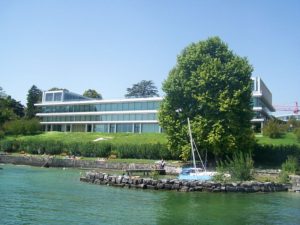Panama Papers Reveal Soccer Corruption
Police raided the Union of European Football Association’s (UEFA) headquarters in Nyon, Switzerland on April 6, following allegations in the Panama Papers that UEFA knowingly helped private companies earn a profit from selling broadcast rights for high-profile international games to regional networks.

The Panama Papers, a collection of eleven million documents, exposed offshore accounts of nearly 215,000 companies and over 14,150 individuals. The International Consortium of Investigative Journalists, which has analyzed the leaked documents, revealed that Mossack Fonesca, a Panamanian law-firm, has been knowingly helping its clients evade taxes, avoid sanctions, and launder money.
British Prime Minister David Cameron is reportedly on the list, accused of holding a significant family inheritance within offshore accounts. Many of Russian President Vladimir Putin’s closest associates, as well as champion Argentine soccer player Lionel Messi, have faced similar scrutiny because of the scandal.
According to the documents released in the Panama Papers leak, UEFA sold broadcast rights for Champions League matches for three years, from 2006 to 2009, to Argentinian company Cross Trading. UEFA confirmed that Gianni Infantino, currently the head of FIFA but an employee of UEFA at the time, was one of two officials to sign the contract with Cross Trading.
The problem lies in allegations that Hugo and Mariano Jinkis, the owners of Cross Trading, resold the broadcast rights to Teleamazonas, a Ecuadorean broadcaster, for three times what the company paid UEFA. The documents for which the Swiss police were searching would draw UEFA into the corruption scandal by directly linking it with Cross Trading’s decision to resell the broadcast rights at a profit. Since Hugo Jinkis was earlier found to have allegedly bribed FIFA executives in return for media and marketing rights for certain games and tournaments, his association with UEFA would throw the European federation’s integrity into question as well. Infantino himself is also facing scrutiny given his involvement with both organizations.
UEFA insists that all deals with Cross Trading were legal and unrelated to their other corrupt transactions with FIFA executives. At a press conference, Infantino stated he was “dismayed by the reports” which he saw as a personal attack on his integrity and welcomes further investigations, following the raid.
However, revelations about alleged corruption within UEFA come directly following reports that Qatar was awarded the 2022 FIFA World Cup after Qatari soccer officials bribed FIFA. Now, the UEFA raid and accusations brought by the Panama Papers have reignited the conversation on corruption in soccer and raise the question of how deep-seated it is within the sport’s institutions.
